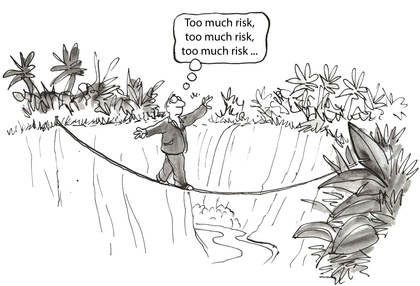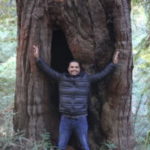
It’s an interesting question that I’m sure you’ve wondered about before.
I mean, it’s like you don’t want to overcome your health phobia or fear of flying, right? Of course you do. It’s not a lack of desire on your part that holds you back.
More likely, it’s knowing that exposure to your fears could make you feel worse.
But that’s why it’s important to remember that when you use exposure to extinguish your fears it should be done gradually.
That’s the most important lesson I learned from this week’s podcast guest Guy Oberwise, LCSW.
Guy is the mood and anxiety coordinator at Timberline Knolls, a residential treatment facility in Lemont, Illinois.
Guy pointed out that when you use exposure you don’t go directly from a fear of snakes to handling one, for example.
You take small steps towards facing your fears in a controlled manner. The sucky part is that recovery can take a while.
In fact, Guy shared a funny (and insightful) conversation with a resident that wondered why her anxiety wasn’t lowering despite trying meditation a few times.
Well it turned out that she had struggled with anxiety for years. But after just a few attempts at relaxation she expected big results.
And that’s a thing. People expecting quick results when they are wrapped up in a complex problem.
Anxiety reduction, whether through exposure or some other means, comes at a price.
That price includes time, patience and hard work. It may also include a bit of pain and discomfort. That’s just the truth.
But if you are willing to face your fears you will inevitably reap the rewards. You will also find out a lot about yourself and how to move forward.
Not just in terms of anxiety, but life in general. So join me for this week’s episode of The Anxiety Guru Show.
Don’t forget to leave your brilliant comments below!






I love your site and interviews. I have to say though that I quit listening to this one when the subject of meds came up. I find it very irritating when someone starts telling us we shouldn’t take meds. If you are on them, it makes you more anxious to hear this. Some people absolutely need them and to be told negative things about taking them is not the way to help. Also, his remark that he didn’t want to tell his age was somehow off-putting to me. Silly, I know, but just an honest reaction I had. I couldn’t care less how old he is, but it just seemed…weird. It made me not like him and therefore have less respect for what he was saying.
I hate to write negative comments, but just had to say this. Just my humble reaction, but thought you might want to hear it!
Thanks for all the great content you give us!
Hey Sheila, that is 100% okay with me. =)
We all have certain beliefs and ideas about what works for anxiety.
I really don’t think there is a wrong or right way. I’ve always said that if something is safe and helpful more power to you.
I appreciate the honest feedback.
Then why do you delete my posts?
I enjoyed the reminders to continually work on coping skills everyday. I know that’s part of my problem. I’ll be really good about it for awhile, but not in the long term if I feel better. Then the anxiety comes on strong all of the sudden and I feel like I don’t know how to handle it. Thank you.
Thank you, Paul! I think if people will listen to the entire podcast, they would hear you say how meds can be beneficial for some people under certain circumstances. I myself am on meds and appreciate how you address both sides of the meds issue.
I know for a fact that exposure training does work. Areas that I have done exposure training in, I no longer have anxiety for. And areas that I have not done exposure training still cause me anxiety. It is very hard work though.
Thanks for the podcast. I have not had chance to listen to it fully. I make no secret of being on meds. Mine helps with the depression more than anything, so is a useful tool when you have the double whammy of depression and anxiety. I do not know how long I will be on meds for. Everyone is unique and their issues are unique.
Thanks gor another great post and podcast, Paul! Meds for me are a definite no – a) because of my anaphylactic reactions to multiple meds. and subsequently the anxiety I have over taking new medication b) because my anaphylaxis specialist wouldn’t approve SSRI’s in my case as they are proven to increase histamine release and c) when I DID try them under strict observation in hospital, my panic attacks increased dramatically (my doctor told me this is not uncommon amongst anxiety sufferers and is a major reason for discontinuation). This is why your blog for me is invaluable. I am, as I have said before, also in weekly therapy for 6 months at the moment and a big part of that will be exposure therapy. I am starting out with psychodynamic work to see where, how and what type of abnormal coping strategies I have developed. It’s qiite an eye opener, I can tell you! I believe from what I am discovering so far that a great deal of this pattern of abnormal coping has come from how I tried to cope and protect myself as a child through some very traumatic experiences. For this reason, I really do see meds as a ‘sticking plaster’ – they may help in the short term but won’t help you to develop coping strategies and ways to live through your anxiety for a happier, more free life. Keep doing what you are doing, Paul- you are helping me incredibly!
I agree with the interviewee that meds are not a long term fix. People can become addicted to benzos, like Xanax and Klonopin, which creates a whole other set of problems. I firmly believe that if you’re going to take medications, you must also be in therapy.
When I was in graduate school, I had panic attacks. Situational. I took a very small dosage of Klonopin and sought out therapy. I learned how to cope with the panic and not panic about the panic. Now I am a practicing therapist and not on any meds. They helped me get through it, but I knew that I wouldn’t want to take them forever. Thanks for the amazing podcasts. They are so helpful.
KC, MSW
I just finished an all day experiential training on exposure therapy and it was wonderful. As you mentioned, regardless of the type of therapy, recovery involves an investment of time, hard work, and patience. Parents of clients, and clients often ask me how many sessions will this take? And I always say, it depends on a number of factors. Both the therapist and the client need to be commited to the treatment process.